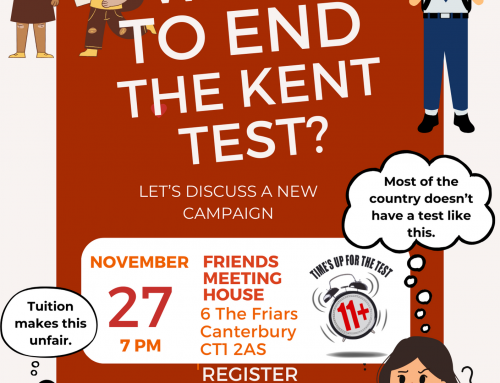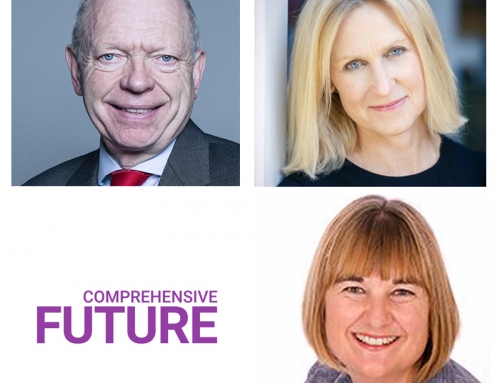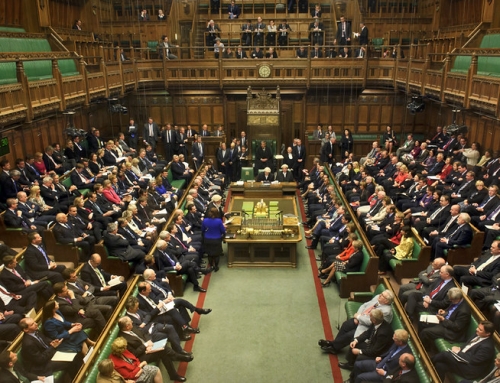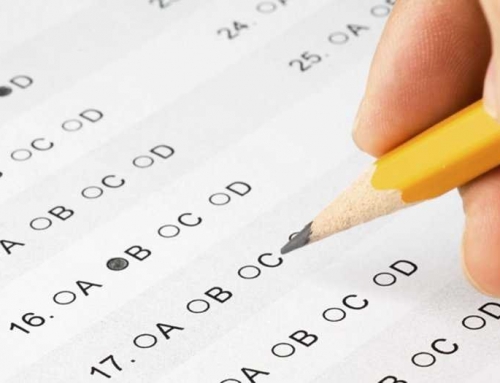The Fair Admissions Campaign’s new report says hundreds of thousands of children have been unlawfully denied access to religiously selective state schools in England, almost all of which are failing to comply with the School Admissions Code.
‘An Unholy Mess: how virtually all religiously selective state schools in England are breaking the law’ has been produced by the British Humanist Association (BHA) on behalf of the Fair Admissions Campaign (FAC). It reveals ‘near-universal noncompliance’ with the School Admissions Code by religiously selective state secondary schools, which together with religiously selective primary schools account for well over a million state school places in England. The report details the rulings of the Schools Adjudicator on the admission arrangements of a sample of such schools, which found widespread violations of the Code in almost every case, confirming public concerns about the way in which religious selection iscarried out in ‘faith’ schools.
The School Admissions Code sets out the rules that all state-funded schools in England must legally follow in setting their admission arrangements, and individuals are able to lodge objections with the Office of the Schools Adjudicator (OSA) if they believe a school has failed to comply.
In 2014 FAC did just that, lodging objections to the arrangements of a representative sample of nearly 50 religiously selective secondary schools. With rulings on all bar one of those objections now completed, the OSA identified well over a thousand Code breaches, with near-universal non-compliance amongst schools. The findings suggest that religiously selective secondary schools across England may be breaking the Admissions Code some 12,000 times between them. Given that 1.2 million school places in England are subject to religious selection criteria, the number of children who are unfairly losing out on places is significant.
The findings reinforce concerns previously raised by FAC, among others, regarding abuse of the admissions system by religiously selective schools, and point to the pressing need for reform. The report makes a series of recommendations to this effect, including calling for the Code to be revised in a number of areas, and for the establishment of an independent monitoring service to enforce better compliance. Ultimately, however, the report concludes that the system of religious selection must be abandoned altogether.
Andrew Copson, Chief Executive of the British Humanist Association, said, ‘Over a million state school places in England are subject to religious selection and it’s well known that religious schools have been abusing the admissions system for some time. Even so, no one can have imagined the problem was as widespread as this report shows. Of course, it’s a scandal to begin with that these schools are able by law to discriminate against children on the grounds of their parents’ religious beliefs, but the fact that they’re seeking to find further ways to turn children away is disgraceful. Religious selection by state schools is the archaic practice that allows these abuses and must be brought to an end.’
Professor Ted Cantle, Chair of the Institute of Community Cohesion (iCoCo) Foundation and author of the Cantle Report into the 2001 race riots, added, ‘The system by which religious schools are able to set their own admissions criteria is clearly not fit for purpose. Not only does it require each school to be incredibly well-versed in the regulations in this area, it also gives cover, as this report illustrates, to those schools that wish to manipulate their intake and discriminate against individual or certain groups of children. This is clearly unacceptable and the system urgently needs to change in order to address it.’
Overview of findings
Particularly notable findings of the report include:
• Almost one in five schools were found to require practical or financial support to associated organisations – through voluntary activities such as flower arranging and choir-singing in churches or in the case of two Jewish schools, in requiring membership of synagogues (which costs money).
• Over a quarter of schools were found to be religiously selecting in ways not deemed acceptable even by their relevant religious authorities – something which the London Oratory School was also found guilty of earlier this year.
• A number of schools were found to have broken the Equality Act 2010 in directly discriminating on the basis of race or gender, with concerns also raised around discrimination on the grounds of sexual orientation and socio-economic status.
• A majority of schools were found not to be sufficiently prioritising looked after and previously looked after children (LAC and PLAC) – in most cases discriminating in unlawful ways against LAC and PLAC who were not of the faith of the school, and in a few rare cases not prioritising LAC and PLAC at all. A quarter of schools were also found to not be making clear how children with statements of special educational needs were admitted.
• Almost 90% of schools were found to be asking for information from parents that they do not need. This included asking parents to declare their support for the ethos of the school and even asking for applicants’ countries of origin, whether or not they speak English as an additional language, and if they have any medical issues.
• Nearly every school was found to have problems related to the clarity, fairness, and objectivity of their admissions arrangements. This included a lack of clarity about the required frequency of religious worship and asking a religious leader to sign a form confirming religious observance, but not specifying what kind of observance is required.
Key recommendations
It is clear now that amongst religiously selective secondary schools there are widespread issues of non-compliance with the School Admissions Code, sometimes intentional, other times inadvertent. In light of these findings, the report makes these recommendations:
1. An end to religious selection by state schools
First and foremost, we think that religious selection amongst state-funded schools should be phased out. The most obvious and straightforward step that can be taken towards ending complexity in admissions, ending socio-economic and ethno-religious discrimination and making the system as fair and straightforward as possible for parents and children is to open up all state schools to all young people, without regard to their or their parent’s religious or non-religious views. There is a range of other reasons why we think this is desirable, all of which are set out on the Fair Admissions Campaign’s website. If the Government is not willing to take steps to phase out religious selection, or even if it is willing, we have also made a number of other recommendations that we hope can help improve things in other ways. These follow.
2. Guidance for schools on complying with the Code
Many of the areas of noncompliance identified in the report are common, and it would therefore be useful if the DfE were to issue schools with guidance. The only previous guidance issued is directed at Free Schools and does not cover many of the issues identified in the report.
3. Revision of the Code to clarify areas of confusion
In addition to recommending areas in which guidance would be helpful, there are a number of areas where the Code would clearly benefit from revision, including around when admission arrangements must be published; frequency and duration of religious worship; only taking into account one and not two parents/carers; excessive information on supplementary information forms; priority for looked after and previously looked after children; the use of the terms ‘expect’ and ‘ask’; final tie-breakers invariably meaning random allocation or taking above the published admission number (PAN); how PANs work with respect to sixth forms; taking into account previous education received; that the lowest oversubscription criterion must be a ‘catch-all’ that allows for the admittance of all applicants; stating how pupils with statements of special educational needs are prioritised; schools not being able to take into account children giving financial or practical support to it or an associated organisation (as is already the case with parents); and the need to publish catchment areas on a map.
4. Establishment of an independent monitoring body to enforce compliance with the Code
As it stands, it is largely incumbent on members of the public to point out possible breaches in schools’ admission arrangements. The findings in the report make clear that this system is not fit for purpose. A pro-active and independent monitoring service is required to ensure compliance with the Code and alert schools to potential areas of non-compliance. Where a matter cannot be resolved informally, cases can be referred to the OSA.
Similarly, no one is ensuring that religious authorities are publishing guidance – as they must if local schools are to be permitted to religiously select. In four cases, including one Church of England
Diocese, it was found that no written guidance for schools had been provided. In several other cases, especially amongst Jewish schools, the guidance goes beyond what the Code allows. It would be a simple exercise to request to see the guidance of all religious authorities, ensure that it exists and ensure that it does not permit admission arrangements that breach the Code.
5. A standard template for admissions policies
Admissions policies are becoming less uniform over time. In 2000 just 30% of all secondary schools were their own admission authority, with the remaining 70% accounted for by the local authority. Now over 80% of secondary schools are their own admission authority. The divergence this creates not only means that breaches or abuses of the Code are harder to monitor, but it also produces an incredibly complex system for parents to negotiate.
Requiring schools to follow a standard template which allows for a variety of Code-permitted criteria would eradicate many of the less ‘malicious’ Code breaches, make the more malicious ones easier to identify and creating a system easier for parents to understand.
6. Admissions policies of all schools to be set by an external body
Beyond the creation of a standard template, it does not make sense for schools to be their own admission authorities. As this report demonstrates, many schools lack sufficient understanding of the Code and schools also have perverse incentives to manipulate their intakes, thereby improving their performance when compared to other local schools. Making some other local body responsible for this, which is free from such incentives, seems obvious.
Read the full report: http://fairadmissions.org.uk/anunholymess/
Read the Fair Admissions Campaign’s briefing on the report: http://fairadmissions.org.uk/anunholymess-briefing/




